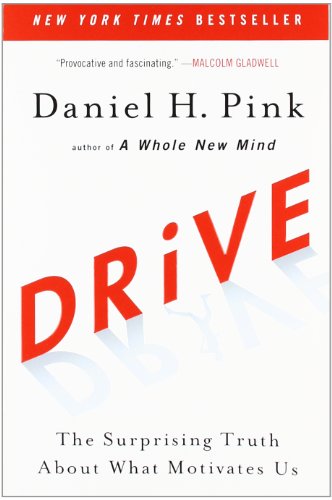By any measure, I've been extremely fortunate to have had multiple dream jobs where I could barely believe that I got paid to do that. This also means I've had to leave all of them except my current one. Whenever that has happened, inevitably I've been asked, "why the hell did you leave that job?"
In the past, I made the decision based on some combination of intuition, emotion, planning (or so I thought), and hope. Lots of hope. I think many people have a similar method.
The last two times I did this, I tried something different.
•••••
When I was considering a job change from my gig at Zynga, I thought a lot about the ideas that Dan Pink shared in his book, Drive: The Surprising Truth About What Motivates Us. In a nutshell, he says the motivators are Autonomy (self-direction), Mastery (the urge to get better at something), and Purpose (to be a part of something greater). These resonated with me and I wanted to capture that in my decision for my next job. I also wanted to tease out a few more things in there as it felt good but incomplete, so I added a few more things: Security (both financial & job), Interest (whether the domain was in and of itself of personal interest to me), and Learning (development beyond my current areas of expertise). Those additional factors seemed rather important enough to me at that time to call out.
I created a simple spreadsheet scorecard using these, added a weighting to prioritize them, and then graded my current job alongside those that I was finding out more about and interviewing for. Using a scale of 1-10 and conditional formatting in Excel, I could easily start to see how each of these potential jobs compared against each other.
I'm not going to say that this was a perfect way to think about it, but the process helped me think through my options. That said, the scores are only the perception I had based on whatever information I was able to glean through interviews and research. The scores are only as good as the quality of the data and my emotional state when thinking about them.
I talked to a lot of companies over a period of six-plus months; I wasn't in a hurry and I felt like I would be able to make a better decision if I wasn't under duress. I even stopped the interview process on a few jobs because they weren't solid enough on my scorecard; I didn't feel like wasting my time or theirs. I ultimately chose to go with Mercedes-Benz as I felt that they hit many of the points that I felt were important, and I was excited to have had the choice.
•••••
I had a great run at Mercedes-Benz leading the Advanced User Experience Design team. I worked with some great people, many of whom I now consider friends. I got to work on some cool stuff like self-driving car concepts, predictive driving concepts, and some near-to-far future user interfaces for cars and connected devices. I learned a ton, including some German.
When new opportunities came knocking, I wanted to take what I had learned about the decision-making criteria for choosing a new job and create a simpler, better framework to help me. I ended up defining four main criteria which I used to assess my job at Mercedes-Benz against a couple other opportunities.
- The job or the grind – would I enjoy what I would be doing 80% of the time? You can always enjoy some of the sexy things in a job that might be 5%-20% of the job, but it's what you do the rest of the time that you don't want to share on Facebook that really matters over the long run.
- The culture – how are decisions made and by whom? Would the principles that govern people's behaviors in the company be compatible with mine and how I want to live my life?
- The potential, both micro and macro – would I have much to learn and room to grow? Does the company have a strong position within a growing or changing industry?
- The compensation – would I be getting compensated fairly, thinking short and long term? Most of us aren't doing our jobs for free, and we participate in a market where our skills have value.
I found this new framework very valuable as a way to compare my options against each other. Staying in my current job was always on the table, but at the end of the day, the opportunity to join Netflix was clearly the right choice for me.
- I would enjoy what I do on a day-to-day basis which is lead a design team responsible for something important to the company. The balance of strategy & tactics, leading & managing, planning & building, breadth & depth, technology & entertainment seemed to be great match for my skills & interests.
- I had been a fan of Netflix's Freedom & Responsibility culture since the publication of its culture deck. When I interviewed, I asked how much of this was aspirational vs. operational; I was convinced by what I heard and saw that it was, in fact, operational. I was impressed by the people I met and how they engaged with me. I was excited by the prospect of being a part of such a culture, especially considering some of my previous experiences working within large, political bureaucracies.
- I saw that I had much to learn from the people I would be working with. How to employ the scientific method in product design at a world-class level through AB testing. How to find the balance between the art & science of design. How to be a leader and influencer among many other world-class practitioners focused on fundamentally changing the industry across the globe. It was going to be a fun challenge to play a part in the evolution of entertainment.
- Part of Netflix's culture is to pay top of personal market. This is outlined in the culture deck and is part of the company's strategy to create a high-performance culture by attracting great people to work together.
After almost nine months in the new job, I am extremely happy about how my decision worked out. My new framework helped me make this latest career decision, and, when asked that inevitable question, I've shared it with a number of people one-on-one. They've encouraged me to share it more broadly which has led to this.
•••••
Making the decision to take a new job is always a stressful one, but I have found that it helps to be explicit about your decision-making criteria when faced with a big decision.
Your criteria may be different than mine. Your prioritization, too. But I believe that the exercise of defining them is invaluable; the specifics aren't as important as the process of thinking through what you care about. My last two times doing this made me balance the emotional and analytical aspects of that decision, and I hope that what I've shared about mine helps you with yours.


